Lee-Anne and Todd Jago talk about finding their tūrangawaewae and launching Maori tourism business Waka Abel Tasman
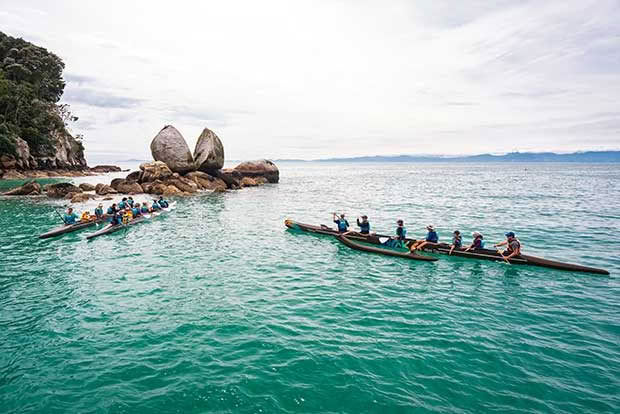
Making sense of the past has allowed a Kaiteriteri couple to shape the future — titiro whakamuri, kōkiri whakamua. Now they are paddling forwards and taking others with them.
Words: Ann Warnock Photos: Oliver Weber
Lee-Anne Jago headed to London in her early 20s on the first stop in a quest to see the world, but her journeying revealed she knew little of her universe. Between working on an organic farm in France and teaching water-skiing in Portugal, she had “a kick-start moment”.
“I was a young Māori woman traveling in Europe and people were asking, ‘where are you from, what is your heritage?’ I didn’t know the answers. I started to ask myself, ‘what are my Māori roots?’”
Lee-Anne grew up in Matamata, the fourth child of loving and supportive parents of Māori lineage, but the concept of Māoritanga wasn’t a component of family life.
“Dad spent his early years growing up on the marae with a team of children, but when my grandparents bought a house in Matamata, his family entered a Pākehā world. I often think how alone my grandmother must have felt without her marae.”
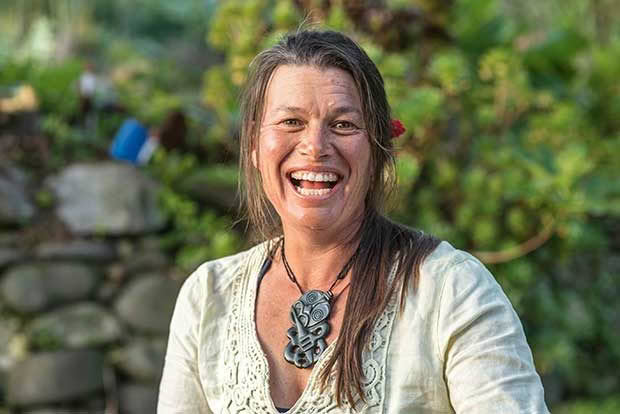
The sea is part of us and part of the way we live,” says Lee-Anne whose hei tiki pendant — a birthday gift from Todd — was made by Richmond-based carver Tim Moran of Taonga by Timoti. Its design includes a hoe (paddle).
She was raised in her grandparents’ Matamata house with her own parents and siblings. “It was an era when people talked about being ‘part-Māori’ and asked ‘what percentage are you?’ I didn’t even know about the different tribal groups.” Fueled by two and a half years of traveling in Europe, where she met people who thought about the planet differently, she returned to Aotearoa and embarked on a double degree in Māori and psychology at the University of Otago. But she and academia didn’t gel. She found the approach to learning institutionalized and disconnected from the Māori world she hoped to probe. Halfway through her studies in Dunedin, she opted out.
She set off north to visit her parents in the Waikato, stopping off to explore the Abel Tasman Coast Track on the way. It marked the beginning of an enduring relationship with the sea, the bush and Abel Tasman National Park. “I was on my own, walking, swimming and kayaking. I thought, ‘Oh my goodness I am so happy here.’ I rang Mum and said, ‘I love this.’” Back in the Waikato, she started a marae-based DOC conservation course in the small settlement of Waharoa, then worked for a summer alongside the kaitiaki (guardian) at Mayor Island, the wildlife refuge off the coast of the Bay of Plenty.
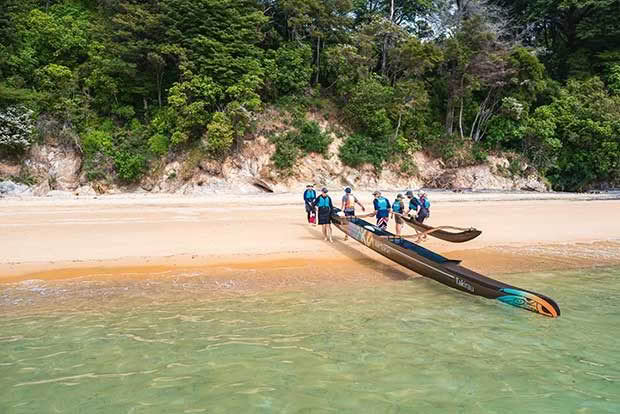
On the beach near Toka Ngawhā, Todd and his paddlers pull up for a break and refreshments — local organic apple juice and Annies Fruit Bars, a natural-snacks company owned by a local iwi corporation. Sitting in a waka is very comfortable — a bit like sitting in a kitchen chair. All ages — young and old — can paddle.
It imbued her with a deep spiritual connection to the land. “I felt everything was coming together. There is a whakataukī [a Māori proverb] which says, ‘When you understand the past, you know your future — titiro whakamuri, kōkiri whakamua.’”
At Waharoa, she’d heard about Whenua Iti Outdoors, a Motueka-based organization that offered educational adventure courses for personal growth wrapped around the principles of Māoritanga. “I thought, ‘I love that part of the world. I’ll go.’”
She enrolled, packed her bags and her pushbike, and flew to Nelson. On her first day, there was a round of introductions. “In my pepeha, I said I was Ngāti Māhuta, Ngāti Pou, Ngāti Raukawa. My tutor was there too — Todd — and he said he was also Ngāti Raukawa. We didn’t realize at the time, but it was the start of something special between us,” says Lee-Anne.
Before teaching at Whenua Iti Outdoors, Todd Jago from Taranaki also had been striving to find where he fitted in the world. “I grew up New Plymouth and school didn’t work out. It was the 1980s, class sizes were big, and it was easy to get missed in the crowd. I left at 15, did a pre-vocational course, pumped gas and partied with mates.”
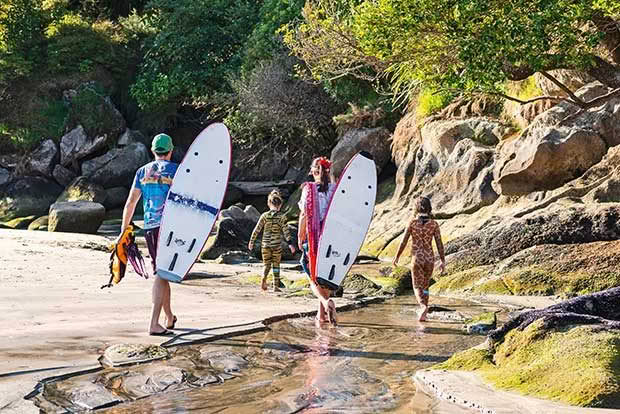
With waka tours and school over for the day the family often heads to the local beach at Anawera (Stephens Bay) with knee boards and some kai.
The bright lights of Sydney looked like a better option. Todd headed across the Tasman and got a job manning amusement rides at a fairground. “We traveled to showgrounds in different towns living in the back of a truck. I saw the underbelly of life but it was an awesome experience.”
Back home in New Plymouth, he felt his eyes had opened but nothing else had changed. “There wasn’t much work around and my mates were still the same.” When a cousin in Motueka, who’d recently launched the Ocean River Adventure Company, one of the first sea-kayaking companies in New Zealand, suggested he attend a course for unemployed young people at nearby Whenua Iti Outdoors, Todd was happy to roll with the idea. “Without my cousin Jan, I wouldn’t be leading the life I now have. I stayed with her young family for the first six months, and she introduced me to the great outdoors,” says Todd.
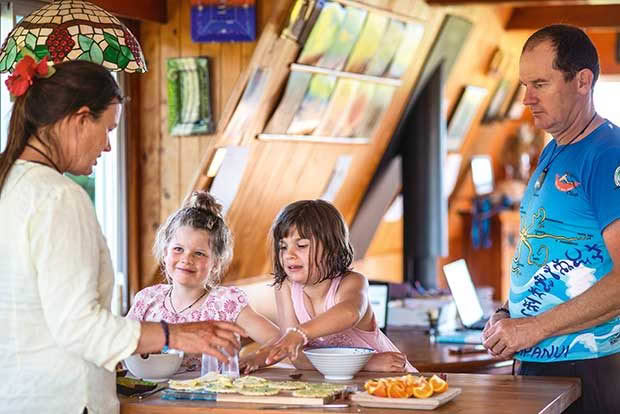
Afterschool snacks for Ariā and Awatea in the kitchen — avocado on crackers and chopped oranges.
At Whenua Iti, he discovered he was good at physical challenges and helping others. “Suddenly, I felt I was on the right path. I was so lucky to have good people around me. My previous lifestyle had been pretty unhealthy with lots of drinking and partying.” Todd stayed on at Whenua Iti and did extra courses, worked for his cousin’s company and qualified as a raft and sea-kayak guide. Later he led heli-rafting trips on the Karamea River and in winter headed overseas to British Columbia, Fiji and the Himalayas to work as a raft and sea-kayak guide. Along the way, he also started tutoring and instructing at Whenua Iti Outdoors.
When he and Lee-Anne crossed paths on the day of Lee-Anne’s pepeha, he was at the helm of a programme he’d attended eight years earlier as a disengaged 19-year-old. While Lee-Anne and Todd’s was a slow-burning romance — at the time Todd had a one-year-old son, Zack, with a former partner — they quickly realized their lives had a commonality beyond a shared love of the sea and an inherent respect for the environment.
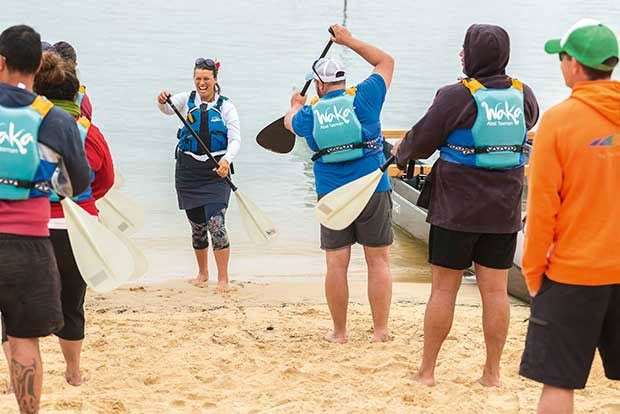
Lee-Anne demonstrates the art of paddling with a group of tourists before setting off from Kaiteriteri Beach.
Todd also had questions about his Māori roots. “I am a fair Māori. My Ngāti Raukawa links are on my mother’s side, but Mum and Dad separated when I was eight. I didn’t know my background.”
In his mid-20s he reconnected with his marae in Ōtaki and his Māori surname of Rikihana. “It has been an amazing journey that is far from over and it’s fully grounded me. My Māori family had a missing piece in its whakapapa and it turned out that was me representing my great-grandfather, Takirau.”
Lee-Anne and Todd say connecting with their Māori culture has been a catalyst for Waka Abel Tasman, the couple’s enterprise, which offers waka paddling on the picturesque waters of Abel Tasman National Park within a cultural framework of tikanga (Māori etiquette).
A powerhouse of skills propels the business. Lee-Anne has a commerce degree from Nelson Marlborough Institute of Technology and is a former operations manager for the South Island-based multi-million-dollar enterprise, Ngāi Tahu Tourism.
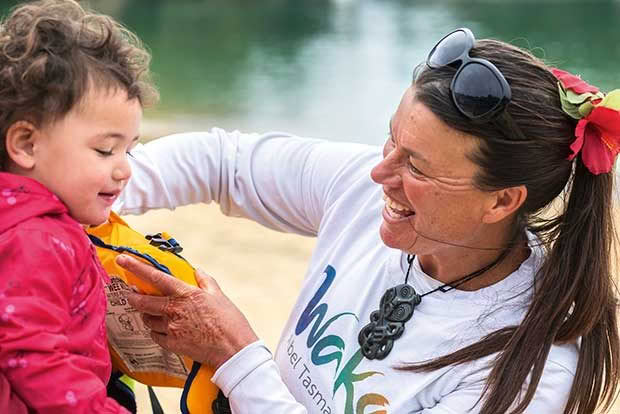
“In the Māori world, visitors are so important, whether it’s a school kid or a CEO, we cherish them.”
Todd is a national assessor for sea-kayak and rafting guides, a teacher of adventure tourism at Nelson Marlborough Institute of Technology, an instructor of waka ama with a focus on rangatahi (young people) and an international-level achiever in waka ama. Using a fleet of three double-hulled waka, they offer three-hour trips and paddling tours that start and finish with a karakia on the beach at Kaiteriteri. Paddlers learn the importance of waka in Māoridom, the protocol around paddling a waka and experience the empowerment of being in a waka crew.
“We knew there was a gap in the market. There was no cultural activity on the water and the time felt right. We started out wanting to create an activity for local families — from young kids to grandparents — where they could feel uplifted by paddling together,” says Lee-Anne.
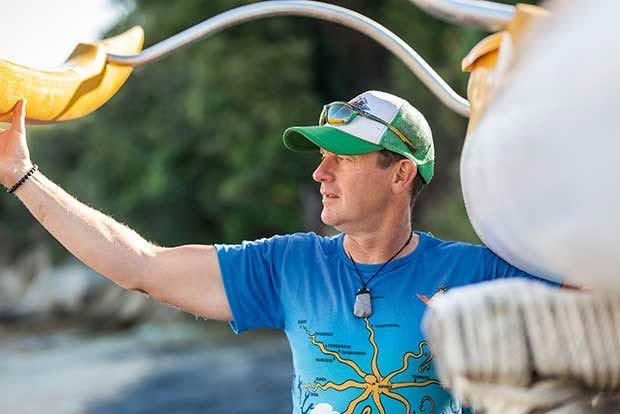
Todd readies himself for waka ama training with local teenagers.
Lee-Anne and Todd’s starting block for the business was a contract for a series of four-day waka journeys for high-school students as part of a national anti-bullying initiative. “The results were miraculous. Those boys learned to show their emotions; they cried at times. Their spirits were raised by paddling in the waka, they felt connected, they learned to look after each other and were inspired by the tikanga,” says Todd.
At the time, Lee-Anne and Todd had leased a boat from the Motueka Waka Ama Club. With the proceeds from the contract, they bought their first custom-made waka. The success of Waka Abel Tasman quickly morphed beyond the local community to tourists — both domestic and international. “When we were first up and running we didn’t say ‘no’ to anyone,” says Lee-Anne. If tourist numbers didn’t fill the waka, empty spaces were given to locals. Over three years, the business has burgeoned.
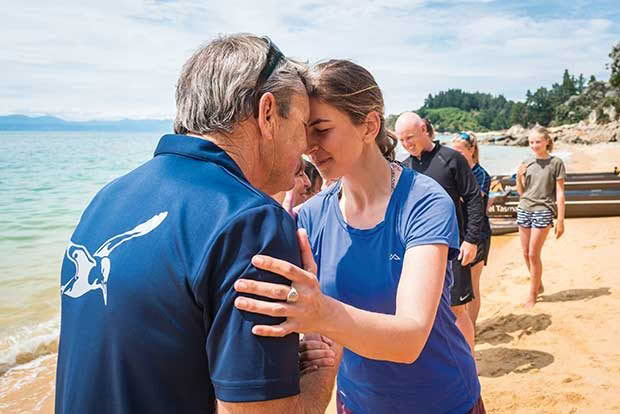
When the paddlers return to shore after their three-hour voyage they learn the significance of the hongi.
“Waka Abel Tasman has been our baby but it now has its own wairua (spirit). There wasn’t a great big business plan. It’s evolved. We haven’t wanted money stresses, so we’ve been very conservative. We were shocked by the compliance costs, but we’ve managed well. As soon as there’s income, we reinvest it in the business,” says Lee-Anne.
Despite the success of Waka Abel Tasman in the tourism marketplace, Lee-Anne and Todd are deeply committed to the people of the Motueka district. “We want to help raise up our local community. The Māori view is that we have a responsibility to the rohe, the tribal area in which we live. Our local iwi Ngāti Rārua and Te Ātiawa are our guides, and we paddle in their ancestral waters.”
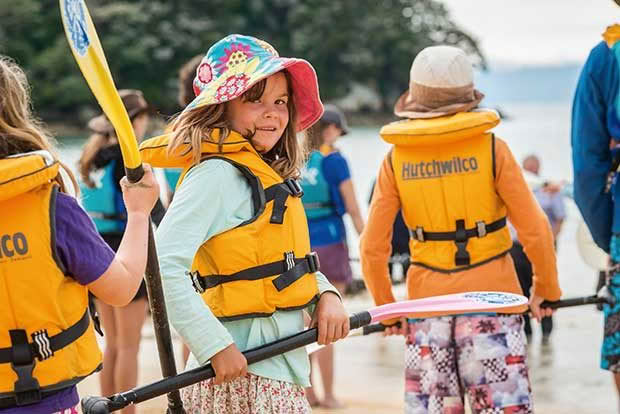
Ariā in her floral sunhat gets ready to join Mum on the waka.
Paddling those ancestral waters is now a seven-day a week operation for Lee-Anne. “When I’m out on the water, there’s so much joy. I’m buzzing every single minute and when you have work that does that to you, it’s not work.” The couple say juggling the demands of Waka Abel Tasman with family life is their biggest challenge. While Lee-Anne’s role is as full-time tour operator, Todd handles Waka Abel Tasman’s onshore business and lectures part-time at Nelson Marlborough Institute of Technology. “Our beautiful daughters Ariā [eight] and Awatea [six] were both born at our home in Stephens Bay. We wanted the girls to be immersed in a Māori space of natural play, the natural environment and te reo,” says Lee-Anne.
While Lee-Anne initially home-schooled Ariā and Awatea, the children now carpool with neighbours to the Rudolf Steiner School in nearby Motueka. “It’s working beautifully, and we take care of their Māori learning at home. We have a tutor through the Tōku Reo language learning programme who comes to our place every two weeks.” Todd’s son Zack now lives in Wellington, and Lee-Anne has been involved in his upbringing from an early age.
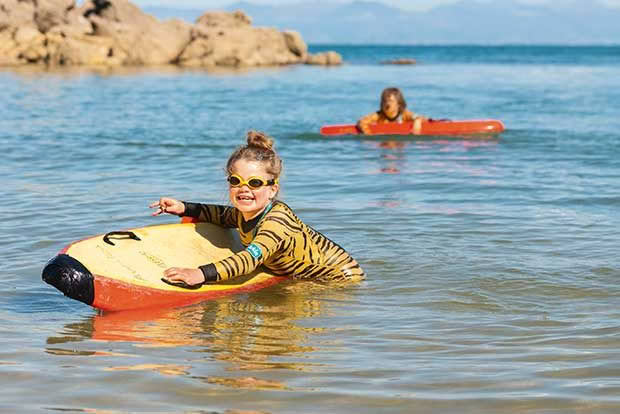
In the winter months when the hectic pace at Waka Abel Tasman lessens, the family takes time out to play at Porters ski area in Canterbury. There are also holiday breaks in the North Island to enjoy. Last year, the family made a special trip to Whangamatā for Lee-Anne’s mother’s 80th birthday. As it transpired, the occasion had an extra layer of meaning. “I was very nervous and emotional, but I addressed Mum in te reo in front of our whole family for the first time. It’s such a beautiful language full of analogies. I wanted to elevate Mum and her position in our family,” says Lee-Anne.
The next day her parents spoke of the joy of hearing their daughter speak the language.
THIS SUMMER WE’LL BE…
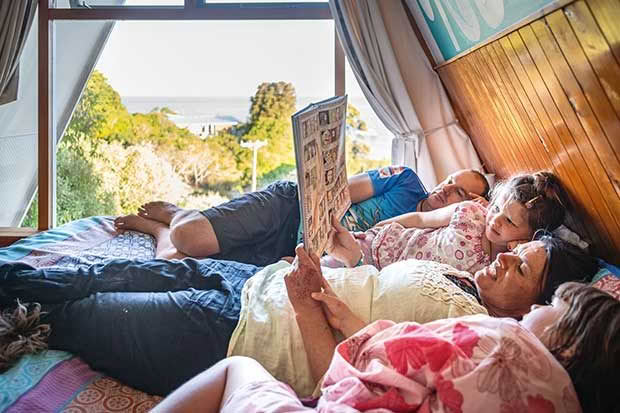
Reading books together on Todd and Lee-Anne’s futon is “a moment when we can just be together and focus on the girls”.
Reading: “Ariā and Awatea love Gavin Bishop’s book Aotearoa: The New Zealand Story which has great information about New Zealand Māori history and plenty to look at, which keeps them engaged. Gavin is a whanaunga of Lee-Anne’s. We both have a huge interest in local history and Hillary and John Mitchell’s four-volume series Te Tau Ihu o Te Waka: A History of Maori of Nelson and Marlborough is always at hand — it’s a lifetime of reading.
Listening to: “We love Kiwi music as well as international sounds from Maisey Rika and Fat Freddy’s Drop to Finnish quintet Oddarrang. We also enjoy music with a bit of an activist/environmental edge like Xavier Rudd and John Butler. The girls like Cyndi Lauper from the 1980s.”
Playing: ”We’ll be taking the girls to the Kaiteriteri Mountain Bike Park, having a heap of beach time, doing some cockle collecting at Marahau, rafting down the Motueka and Buller Rivers, and taking trips over Takaka Hill to Golden Bay to get some cheap avocados while visiting friends.”
WAKA ABEL TASMAN
● Waka Abel Tasman launched in early 2016. It has three double-hulled waka and is the only business of its kind in the South Island.
● Its client base includes international and domestic tourists, corporates seeking team building, school groups, iwi and local families. It’s an e-business — there is no office, everything happens online.
● The waka are custom-built by Moana Nui, a small family company near Tutukaka.
● It’s the first waka business in Aotearoa to be externally audited under Adventure Activities Regulations (2016) and is a certified adventure company.
Love this story? Subscribe now!
 This article first appeared in NZ Life & Leisure Magazine.
This article first appeared in NZ Life & Leisure Magazine.
